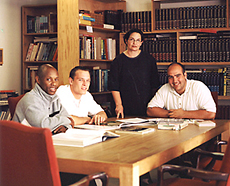 |
We function as an extended family, rather than a more typical program. Our daily operations are not funded and we charge no fees. We pool all our resources. There is no staff. The whole place is run by the residents themselves. All money is funneled into the community, and each resident receives food, housing, clothing, education, entertainment and all other services at no cost.

Residents tutor one another to achieve a high school equivalency degree, followed by a 2 year liberal arts core curriculum. Residents may pursue college degrees. |
We take applications from people who have hit bottom, from prison, jail or walk-ins. Residents who have been at Delancey Street awhile interview all applicants. The minimum stay is 2 years; the average stay is 4 years. We have 3 rules: no drugs or alcohol, no physical violence, and no threats of violence. The goal is to learn to lead a productive crime-free, drug-free life of purpose and integrity. Everyone learns a marketable skill (the goal is 3 skills), and earns at least a high school equivalency degree. Advanced education is available.
First we teach our residents personal skills: how to break old habits, how to get along with other people, particularly those different from us. Many have been homeless, so we teach basic hygiene. Most have never had jobs, so we teach basic work habits – showing up on time, listening to a boss, and getting along with coworkers.
When ready, residents enter one of our vocational training schools – where with training from more experienced residents, they start at the bottom and work their way up. In the restaurant, for example, one can go from dishwasher to prep cook to line cook to managing chef.
We offer tutoring to our residents to complete a high school equivalency education followed by college courses; and for those who stay 3 years we have our post secondary Academy under BPPE. Delancey Street’s own residents do the teaching and tutoring. As in our vocational training, the method is “each-one-teach-one”. If you read at an eighth grade level, you can teach someone who reads at a sixth grade level – and you get better by helping others.
 As our academic and vocational training developed we began working on a semester system. Accordingly, like the best universities, people can take a “semester abroad”. Our bus goes from facility to facility each semester allowing someone who entered in New Mexico to spend a semester in New York and someone who entered in North Carolina to spend a semester in Los Angeles, etc. As our academic and vocational training developed we began working on a semester system. Accordingly, like the best universities, people can take a “semester abroad”. Our bus goes from facility to facility each semester allowing someone who entered in New Mexico to spend a semester in New York and someone who entered in North Carolina to spend a semester in Los Angeles, etc.
We learn about ourselves and how to develop our strengths, not through therapy groups, but through actually practicing life skills, living, working, and interacting in the community. When mistakes are made, we learn to acknowledge them, take the consequences (our punishment is extra work, usually doing the dishes) and most importantly, because we are in a safe environment we can fix the mistakes. In this way, we replace old self-destructive habits with new strengths, talents, and a sense of responsibility.
When ready to graduate from Delancey Street, residents get a job and live in and work out for several months, saving their money in our Delancey-managed credit union, and paying rent until they can move on to continue their new lives in the mainstream of society.
For a more detailed description of the model, read "Mimi Silbert’s Process of Mutual Restitution," Chapter in the book, "Mental Health and the Self-Help Revolution".
Related Media
 Delancey Street Foundation on Evening Magazine (Quicktime) Delancey Street Foundation on Evening Magazine (Quicktime)
 Chapters in book, Influencer, (McGraw-Hill, New York, New York, 2008) Chapters in book, Influencer, (McGraw-Hill, New York, New York, 2008)
 Chapter in book, Criminal Justice in Action," Instructor's Edition, (The Thomson Corporation, Belmont, CA., 2007) Chapter in book, Criminal Justice in Action," Instructor's Edition, (The Thomson Corporation, Belmont, CA., 2007)
 "The Prison That Thinks It's A Kibbutz" (The Jerusalem Report, 01/02) "The Prison That Thinks It's A Kibbutz" (The Jerusalem Report, 01/02)
 "Mending Broken Lives," (American Psychological Foundation Summer 2001) "Mending Broken Lives," (American Psychological Foundation Summer 2001)
 "Life On The Outside Begins With A Haircut And A Job" (The London Times, 09/00) "Life On The Outside Begins With A Haircut And A Job" (The London Times, 09/00)
 Chapter in book, Self-Efficacy, The Exercise of Control, (W.H. Freeman and Company, New York, 1997) Chapter in book, Self-Efficacy, The Exercise of Control, (W.H. Freeman and Company, New York, 1997)
 Reprinted from: Anderson, Walter, Chapter in book, The Confidence Course, (Harper Collins, New York, 1997) Reprinted from: Anderson, Walter, Chapter in book, The Confidence Course, (Harper Collins, New York, 1997)
 "The Making of a Drug-Free America, Programs That Work," (Random House, Inc., New York, 1992) "The Making of a Drug-Free America, Programs That Work," (Random House, Inc., New York, 1992)
 "They Earn Their Way Back." (Parade 11/87) "They Earn Their Way Back." (Parade 11/87)
|
 |



